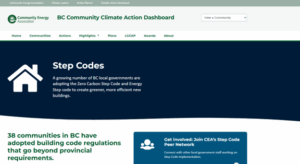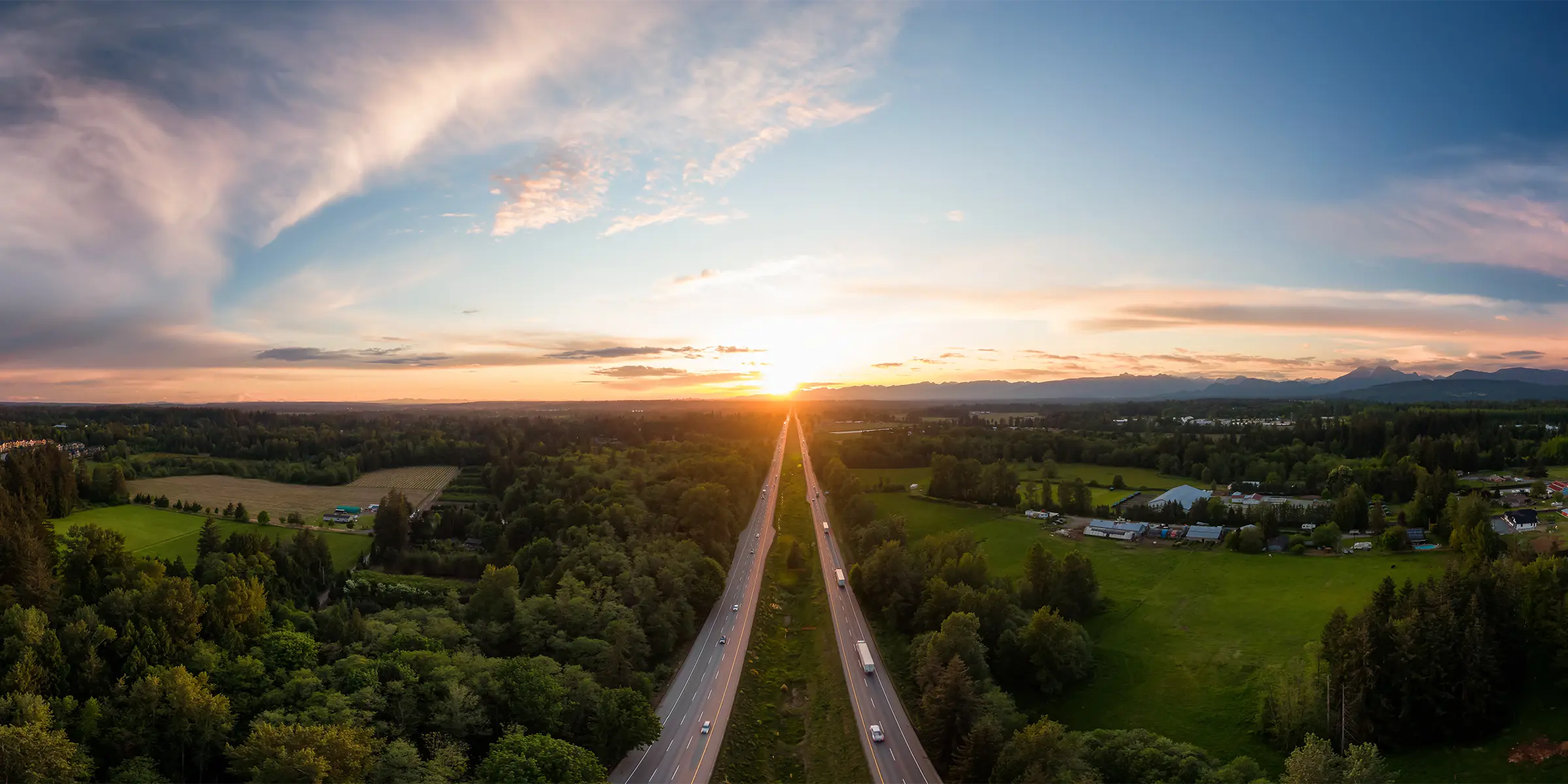
Industry engagement key to Township of Langley’s accelerated adoption of Zero Carbon Step Code
Case Study
Published: May 28, 2025
Updated: n/a
Relevant Topics: Policy, Transportation
Since introducing a green building rebate in 2014, the Township of Langley has been a leader in collaborating with the local building industry to increase construction of energy efficient buildings. Alongside the adoption of the Energy Step Code in 2019, the Township expanded the ways they support local builders through education, training, engagement, and consultation. This contributed to the Township’s ability to advance building policies without facing pushback or resistance from the community and building industry. In December 2023, the Township of Langley became the first community south of the Fraser River to adopt Zero Carbon Step Code (ZCSC).
Published: Oct. 16, 2025
Relevant Topics: Policy, Building Code
Climate Zone: 4
Context
The Township of Langley is a vibrant and growing community situated in BC’s Fraser Valley on the traditional territories of the q̓ic̓əy̓ (Katzie), q̓ʷɑ:n̓ƛ̓ən̓ (Kwantlen), Máthxwi (Matsqui), and Se’mya’me’ (Semiahmoo) First Nations. Nestled within Metro Vancouver’s eastern edge, it offers a unique blend of urban centres, rural landscapes, and productive agricultural land. Its location along the Trans-Canada highway, proximity to Vancouver, and mild climate make it an attractive place to live. So, while three quarters of its land is designated as Agricultural Land Reserve (ALR), Township of Langley’s population is projected to double in the next 15 years.
This growth will require 1,300 new housing units built every year to 2041. Like other communities in metro Vancouver, housing affordability is already deteriorating. But Township of Langley has long been one of BC’s fastest growing communities (from 2011–16, the Township's population increased by almost 13%, making it Metro Vancouver’s fastest-growing municipality over that period).
The Township is not shying away from the opportunity and responsibility to shape, define, and foster a vibrant, sustainable future for its residents, by joining rapid growth in housing with a commitment to climate action and agricultural preservation. Buildings are a major source of greenhouse gas emissions in the Township of Langley, accounting for 30% of yearly emissions.
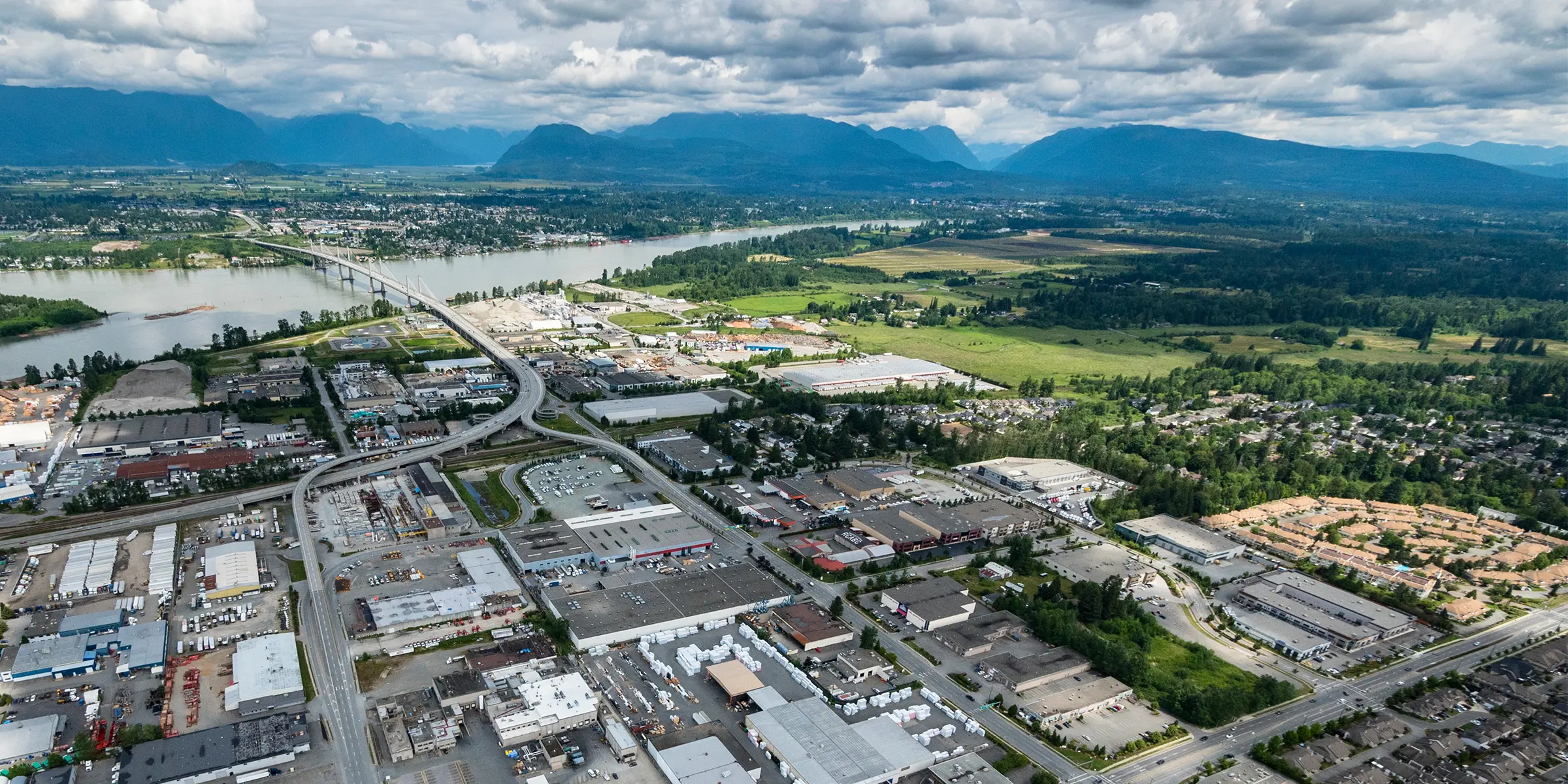
The path to Zero Carbon Step Code
In 2019, the Township declared a climate emergency and promptly advanced an action from their 2013 Housing Plan by adopting the Energy Step Code. This was a full four years before Step 3 of the Energy Step Code became mandatory. Then, the development and adoption of a Climate Action Strategy in 2021 gave staff a target that “all new buildings in the community produce zero emissions by 2030.” Since then, the Fraser Valley experienced devastating atmospheric rivers and, along with the rest of BC, heat domes that made deadly clear how important it is for homes to be resilient to extreme weather.
When the Zero Carbon Step Code (ZCSC) was introduced in the BC Building Code (BCBC) May 2023 update, local governments had the option to opt in by referencing it in their building or zoning bylaws. In Dec. 2023, the Township of Langley Council unanimously approved the elevation of BC Energy Step Code requirements along with the addition of Zero Carbon Step Code requirements for Part 9 residential buildings. In doing so, they became the first community south of the Fraser River to adopt Zero Carbon Step Code.
Contributors

Katherine Pearce
Regional Collaboration Lead
Community Energy Association

Lisa Mak
Climate Solutions Specialist
Community Energy Association
Rationale
Having adopted the Energy Step Code in 2019, by 2023 the Township had considerable information to analyse how industry was meeting Step Code. “The Green Buildings department collects building permit data to better understand their communities, and the data showed that many builders were already meeting and exceeding current requirements,” said Kevin Ramlu, Building Energy Manager for Township of Langley. A 2019 survey of industry stakeholders revealed that that a good portion of buildings were easily meeting Steps 1–3, and of those homes, 20% were meeting Step 4 air tightness targets with techniques and materials that were already available in market[1]. This bolstered Township staff confidence that the local building community was ready and could meet higher Energy Step Code levels.
Furthermore, neighbouring municipalities, including City of Vancouver, City of Richmond, District of North Vancouver, and District of West Vancouver, were already advancing both Step Codes. Regional consistency can be an important factor in fostering buy-in and compliance, especially for builders who work across jurisdictions.
Finally, when the Province introduced the Zero Carbon Step Code, they also previewed a new cooling requirement which would become part of the 2024 BC Building Code. The “overheating protection” or “cooling requirement” stipulates that one living space per dwelling unit must be able to keep a maximum temperature of 26 ºC. To properly comply with this requirement, builders need to further comply with the BC Building Code requirement to take CSA F280 measurements—a requirement since 2012 but on that hadn’t been rigorously enforced (a 2024 Township survey found that over 56% of its surveyed builders could be non-compliant).
Foreseeing that Step 4 of the Energy Step Code and some level of Zero Carbon Step Code would soon be made mandatory by the Province, the Township decided that early market signals and consistency would help industry comply with all of the new requirements. The Township started adoption with EL-2 (the second tier, representing moderate carbon performance), reasoning that this would position the local building community to meet and exceed future changes from the Province.[2]
[1] By 2025, the proportion has already risen to 30%.
[2] As of April 1, 2025, Township of Langley now requires EL-3 compliance (strong carbon performance) for new Part 9 residential construction.
Supporting Solution
The backbone of the Township of Langley’s policy development is their investment in building and nurturing relationships with the local building community. Over time, their initiatives have contributed to a robust local industry that understands high performance building practices while also enabling two-way communication where builders’ voices are heard and policy supports them.
Ongoing training and engagement
In 2019, alongside their voluntary adoption of Energy Step Code adoption, the Township held a number of Builder Breakfasts offering education and training opportunities to industry stakeholders. Seeing the value of quality industry engagement and training, the Township then launched what is now known as the Builder Forum Series (BFS). The BFS offers free, in-person and online seminars by industry leaders, helping builders achieve Step Code targets by teaching about airtightness, heat pumps, ventilation, and other topics. Since 2017, BFS has reached an audience of well over 250 participants and attracted attendees from across Canada.
“We found at the Step 5 workshops that our attendees were asking sophisticated and highly technical questions,” said Ramlu. “This tells us our industries are eager to move forward and that they look to the Township for that extra bit of knowledge to help them make Step Code and low-carbon construction work for them.”
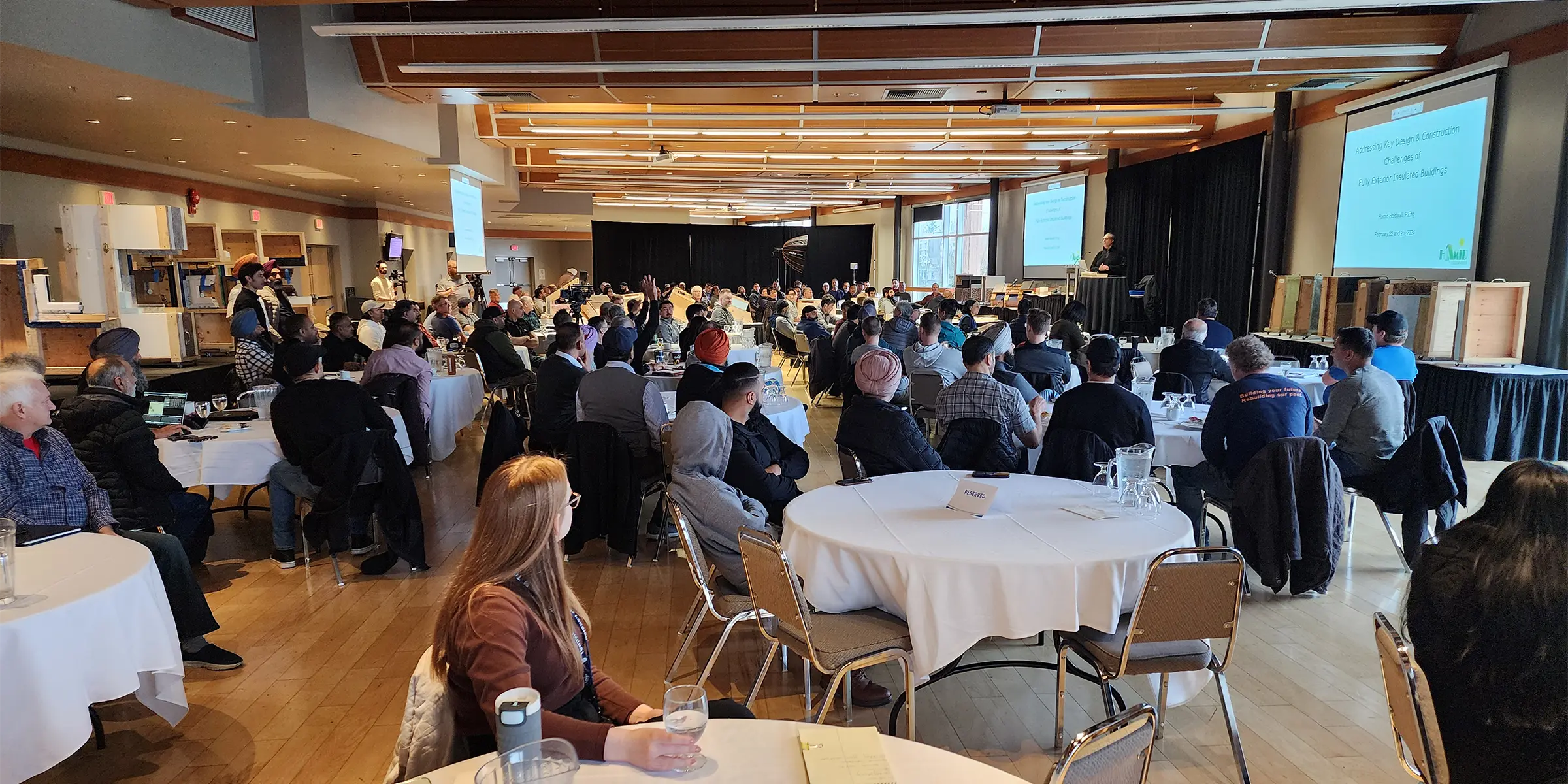
Other innovative training and education opportunities offered by the Township include: in-person, interactive workshops; tours and live training on active construction sites to demonstrate real-world techniques and strategies for meeting Step Code targets; and lectures with interactive group-work where attendees can put what they learned into practice with their peers.
The Township’s testimonials from builders, designers, realtors, energy advisors and others training participants speak for themselves. “I’ve attended probably a dozen of the workshops. I learn something new every single time I attend,” said Steve Riley, president of S.P. Riley Residential Design.
For its online audience, the Township has invested in communicating opportunities widely, distributing a Green Buildings for Builders and Industry newsletter and maintaining detailed Green Buildings and Step Code web resources housing bulletins, downloads, webinars and other training.
“For builders who cannot attend our in-person events due to proximity, or cannot attend our online events because of timing conflicts, the Township of Langley offers a one-of-kind free service, Green Buildings On-Demand (GBD),” said Ramlu. “This offering provides fully accredited educational building related workshops, all online, and free. The users of GBD can watch a workshop any time and still receive their professional development hours.”

Overheating protection bulletin
The BC Building Code’s overheating protection requirement simply states:
9.33.3.1 2) At the outside summer design temperature, required cooling facilities shall be capable of maintaining an indoor air temperature of not more than 26°C in at least one living space in each dwelling unit.
To support compliance, the Township published a bulletin outlining three methods for builders to achieve overheating protection: 1) installing central, mechanical cooling 2) providing a refuge room with mechnical cooling, or 3) using passive cooling techniques. The bulletin helpfully details the requirements for each of these methods and also makes clear the benefits and downsides. For instance, the refuge room and passive cooling approaches require additional data reporting (an additional F280 report for a refuge room, an engineer’s energy model for passive cooling). And while central air conditioning can automatically meet compliance for the first method, the Township highlights how a heat pump can further meet the Zero Carbon Step Code’s EL-2 requirement, and with no additional reporting needed.
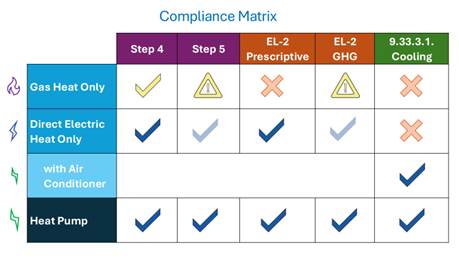
The Oct. 17, 2024 Builder Forum Series webinar on “Step Code Airtightness and Overheating Design” gave the Township of Langley further opportunity to frame Zero Carbon Step Code compliance as an easy step in harmony with other BC Building Code measures.
Presenters at the webinar highlighted how the Energy Step Code and Zero Carbon Step Code requirements can be met using electric or even natural gas appliances (it’s possible for gas heating to meet Step 4 and even EL-2 with low enough thermal energy demand). However, neither can meet the cooling requirement without adding a separate central air conditioner; only a heat pump supports compliance with all three codes. “Of course the heat pump gives you a check mark on all and any of these options,” said Ramlu.
Key Takeaways
The long history of builder training and engagement and the specific success of the Builder Forum Series has led to a fruitful, mutually-beneficial relationship between the local industry and the Township. Local builders are meeting or exceeding building requirements, are prepared for regulation changes, and are building safer, more efficient homes. Their buy-in and active contribution to policy processes have made it possible for the Township to advance multiple building code requirements at a time when builders are busier than ever. Zero Carbon Step Code implementation was an opportunity to continue supporting industry to build better, meet new Code changes, and advance climate and housing priorities.
“I tell you, the Township of Langley has done an awesome job….I believe more of the other cities should learn from this,” said local builder Rajeev Jain.
Contributors

Rob van Adrichem
Director of External Relations
Community Energy Association
Move from inspiration to implementation
With a great case study, you can learn what has worked in a community like yours. You can be inspired to bring an innovation home.
But you don't have to struggle to implement this on your own. Join the BC Local Government Peer Networks to gain the support you need to take inspiration to implementation.
Related Content
Energy Step Code and Zero Carbon Step Code Explainer
Effective March 10, 2025, Emissions Level 1 (EL-1) of the Zero Carbon Step Code is required for Part 9 and Part 3 new construction in BC. Check out this factsheet to see what the new requirements entail.
Climate Action Dashboard: BC communities going beyond provincial requirements
The BC Climate Action Dashboard houses a database of the BC communities that have adopted Zero Carbon Step Code and Energy Step Code.

